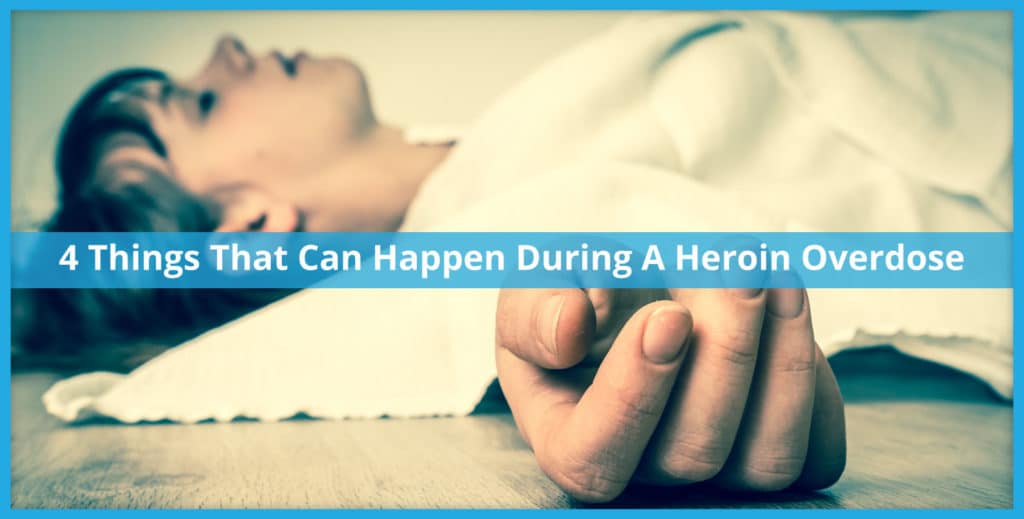If you notice any of the following things that can happen during an overdose, call 9-1-1 immediately.
1. Breathing Starts To Shut Down
Heroin attaches to the opioid receptors in the brain, flooding the brain with dopamine and creating the heroin “high.” One of the places opioid receptors get activated is the brain stem. This part of the brain regulates many involuntary functions of the body, like automatic breathing. It’s why you don’t have to remember to breathe and why you don’t stop breathing when you sleep. As heroin floods the brain stem and saturates the opioid receptors, respiration starts to slow down. A person in the midst of overdose might experience:
- shallow breathing
- slow breathing
- erratic breathing
They may also gasp for breath or exhibit a “death rattle” gurgle that sleeping partners may mistake for sleep apnea. The opioid receptors also trigger a little-understood effect called “pulmonary edema,” where the lungs fill with fluid. Some of this fluid may gather around the nose. The fluid in the lungs makes overtaxed lungs have to work even harder as involuntary functions shut down. As the overdose progresses, breathing may stop, which can easily lead to death or brain death.
2. The Cardiovascular System Starts To Shut Down
Overwhelmed by opioids, the brain stem starts failing to another one of its key jobs—maintaining a regular, strong heartbeat. This compounds the danger that the body and the brain will run out of oxygen. The overdose has already compromised the victim’s breathing. Whatever oxygen the shallow breathing has taken in cannot be distributed to vital organs without the heart pumping it there. Deprived of oxygenated blood, the skin, tongue, and fingernails become visibly bluish or purplish in light-skinned victims, or pale or ashen in dark-skinned victims. During an overdose, the blood pressure may drop to dangerous levels. The pulse may become slow, thready, or erratic. Ultimately, the heart might even stop altogether.
3. The Musculoskeletal System Starts To Shut Down
A heroin overdose may cause the victim to lose motor skills. Blocked receptors cause the brain to relinquish control of skeletal muscles, causing them to become limp and unresponsive. Additionally, the distressed cardiopulmonary system may no longer deliver an adequate supply of oxygenated blood to the muscles. This may cause a feeling of numbness or “pins and needles” in the muscles. Additionally, the muscles in the eyes go slack, causing the pupils to contract to tiny pinpoints—hence the name “pinpoint pupils.” Ultimately the victim may lose their ability to move or stand. In some ways, this is similar to the apathy associated with the heroin high, but it is actually more dangerous. Someone who is high perhaps can’t be bothered to move. Someone in the midst of a heroin overdose may be physically unable to move.
4. The Brain Starts To Shut Down
One of the hallmarks of the heroin high is the “nodding off” effect, where people look like they doze off in the middle of a sentence while sitting up. The dopamine rush of heroin produces a feeling of euphoria and relaxation. Brain function begins to slow as more and more opioid receptors get blocked in the activation of this high. The victim’s speech may become slurred or become unable to speak despite being awake (aphasia). The victim may lose consciousness. In the case of a heroin high, this may just be a deep sleep or a temporary condition. However, in the midst of an overdose, trouble is brewing elsewhere. The lungs don’t take in enough oxygen. What oxygen they do take in is distributed inefficiently throughout the body because the cardiovascular system has begun to shut down. This general lack of oxygen delivery can lead to brain hypoxia or a lack of sufficient oxygen in the brain. Deprived of its most essential fuel, the brain starts to shut down quickly, slipping into a coma and risking brain death within minutes, or physical death within a few more minutes.
Call For Help Immediately
If you suspect a friend, loved one, or a stranger is in the midst of a heroin overdose, contact emergency medical services immediately. Whether in minutes or hours, their life could be at risk. To learn more about how to safely and effectively quit heroin dependence disorder and achieve lasting sobriety, reach out to The Bluffs today. Sources: International Overdose Awareness Day—Overdose Basics Science News—Fatal Fix: How an Opioid Overdose Shuts Down Your Body








